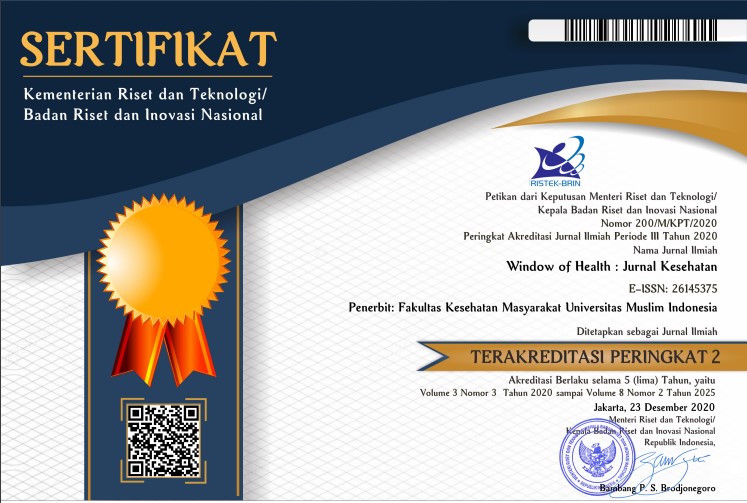The The Application of a family intervention model based on health education towards Patient's Diabetes Mellitus Type II Self-Care at the Oesapa Public Health Center, Kupang City
Abstract
Diabetes Mellitus is a chronic metabolic disease, and the number of sufferers increases every year. The Province of East Nusa Tenggara also experienced an increase of 1.2% for ages >15 years of 0.86%. The Kupang City region has the highest number of diabetes mellitus cases in East Nusa Tenggara Province, i.e., 29,242 patients. The number of people with diabetes mellitus increased from 2016 to 2018 at the Oesapa Health Center from 125 to 200 people. According to the latest data in 2020, there are 461 diabetes patients. To prevent an increase in mortality due to this disease, diabetes mellitus patients are expected to have good self-care with the support of family care. This study aimed to analyze the application of the Family Intervention Model to Self-care of Type II Diabetes Mellitus Patient's Health Education Based. A total of 80 respondents participated in filling out the Diabetes Self-Care Activity questionnaire. This research design is a queasy experiment. The data analysis used was the Paired T-Test with the result that there was an effect of the Application of the Family Intervention Model on Self-care of Type II Diabetes Mellitus Patients Based on Health Education with an α value of 0.000. This study concludes that providing health education through media books to families affects family intervention in patients so that they can improve self-care in patients with type II diabetes mellitus. Health workers should provide health education through book media to strengthen the Family Intervention Model for the care of Type II Diabetes Mellitus Patients.
References
2. Anne van Puffelen, dkk. 2019. Self-Care of patients with type 2 diabetes mellitus over the course of illness: implications for tailoring support. Journal of Diabetes & Metabolic Disorders. https://doi.org/10.1007/s40200-019-00479-y
3. Ahmed & Yeasmeen. 2016A. ctive family participation in diabetes self-care: a commentary
4. Arshiya A. Baig.et al.2015. Family interventions to improve diabetes outcomes for adults. doi:10.1111/nyas.12844.
5. Burns, N. and Grove, S.K. (2005) The Practice of Nursing Research: Conduct, Critique and Utilization. 5th Edition, Elsevier Saunders, Missouri. Open Access Library Journal, Vol.3 No.10, October 26, 2016
6. Brunner and Suddarth. 2015. Keperawatan Medikal Bedah. Jakarta: EGC
7. Davide AusilI, dkk. 2017. Self‑care, quality of life and clinical outcomes of type 2 diabetes patients: an observational cross‑sectional study; .[ Pudmed ]
8. Dinas kesehatan kota kupang, propinsi NTT tentang 10 penyakit terbesar tahun 2018.
9. Dinas Kesehatan Provinsi Nusa Tenggara Timur. 2018. Journal Profil Kesehatan Provinsi NTT tahun 2018. Tersedia di web http:/www.dinkes-kota kupang. Profilkesehatan. Profil- kesehatan-nusa-tenggara-timur-ntt.
10. International Diabetes Federation. (2017). IDF Diabetes Atlas 4th Edition. ADA
11. Khadija A Matrook.2018. Family-based interventions for adults with type 2 diabetes mellitus. DOI: 10.1002/14651858.CD013064.
12. Nadya dos Santos Moura.et. al.2019. Literacy in health and self-care in people with type 2 diabetes mellitus. doi.org/10.1590/0034-7167-2018-0291
13. Najwa S. ElGerges (2020 ) tentang Effects of therapeutic education on self-efficacy, self- care activities and glycemic control of type 2 diabetic patients in a primary healthcare center in Lebanon; .[ Pudmed ]
14. Notoatmodjo, S (2010). Metodologi Penelitian Kesehatan, Jakarta: RinekaCipta
15. Nursalam, (2016). Metodologi Penelitian Ilmu Keperawatan Pendekatan Praktis, Edisi 4, Jakarta: Salemba Medika
16. PERKENI. 2015.Pengelolaan dan Pencegahan Diabetes Mellitus Tipe II di Indonesia. PERKENI. Jakarta
17. Pearl Anna McElfish. Et.al.2015. Family Model of Diabetes Education with a Pacific Islander Community. Diabetes Educ. doi:10.1177/0145721715606806.
18. Rahayu Eva, et.al. 2018. Determinants Of Self-Care Management In Patients With Type 2 Diabetes Mellitus. Jurnal Keperawatan Soedirman. DOI : 10.20884/1.jks.2018.13.2.763
19. RISKESDAS. (2013). Riset kesehatan dasar badan pendidikan dan pengembangan kesehatan kementerian kesehatan RI
20. RISKESDAS. (2018). Riset kesehatan dasar badan pendidikan dan pengembangan kesehatan kementerian kesehatan RI
21. Sari Alhaik, et.al. 2018. Assessment of Self-Care Activities for Patients' with Diabetes Mellitus Type II.
22. Sofonyas Abebaw Tiruneh.dkk. 2018. Factor fluencing diabetes self-care practice among type 2 diabetes patients attending diabetic care follow up at an Ethiopian General Hospital;
.[ Pudmed ]
23. Short Communication - Diabetes Management (2016) Volume 6, Issue 5. ISSN 1758-1907
24. Tewahido Dagmawit, Yemane Berhane. 2017. Self-Care Practices among Diabetes Patients in Addis Ababa: A Qualitative Study; .[ Pudmed ]
25. Zuhayer Ahmed & Farjana Yeasmeen pada 2016. Active family participation in diabetes self-care: a commentary; .[ Pudmed ]
26. Xu Yingqi, et.al. 2019. The impact of provision of self-monitoring of blood glucose supplies on self-care activities among patients with uncontrolled Type 2 diabetes mellitus: A prospective. https://doi.org/10.1016/j.diabres.2019.107873 0168-8227/ 2019 Elsevier B.V.
27. World Health Organization (2020)
28. Widyanata. (2018). Penerapan Kalender Dm Berbasis Aplikasi Android Sebagaimedia Dsme (Diabetes Self Management Education) Terhadap Self Efficacy Dan Kadar Hba1c Pada Pasien Diabetes Mellitus Tipe 2. Universitas Airlangga. Retrieved from http://repository.unair.ac.id/78293/2/TKP 86_18 Wid p.pdf
Copyright (c) 2023 emiliandry banase, Febtian Cendradevi Nugroho

This work is licensed under a Creative Commons Attribution-NonCommercial-ShareAlike 4.0 International License.








